BABAKAR SEGNANE, SENEGAL
Project: Agriculture, chicken breeding, restaurant, event room, catering
Starting point in Germany: Prien am Chiemsee
His mission: Creating workplaces and a livelihood for the village of Musa
Return: November 2017
Current status: Completed
THE PROJECT
In May 2015, Babakar Seder Segnane came to Prien in hope of finding better work opportunities. He had weathered a dangerous journey. However, his dream to work in Germany to support his family in Senegal proved to be unfulfillable. He had risked his life because he could not see a prospect in his home country, but now, he could not profit from his skills in Germany either. Nevertheless, he soon engaged in several activities in Germany and became well-known in the town of Prien over only a short period of time. When his asylum application was rejected, he had two choices: either descend into illegality in Germany or return to his home country. With the support of the citizens of Prien he was able to develop a business plan and receive start-up funding. Babakar gained new hope and prospects and eventually decided to return to Senegal.
In November 2017, everything was ready at last. Babakar returned to his native village Musa. Musa lies in Central Senegal in the region of Kaffrine and was founded by Babakar’s grandfather at the beginning of the 20th century. Thanks to his father, the once small agricultural enterprise became a sustaining basis of existence for both his family and his village community. After his father died, the enterprise was dissolved and the land was distributed among his children. Babakar inherited 10 hectares of land.
During rainy season, peanuts, sweet corn, millet or manioc can be grown on the land, which Babakar – due to our funds – was able to do even before his return, in the summer of 2017. His brother took care of the peanut sowing, but for the rest of the year, the land lay fallow due to the lack of watering and the villagers were unemployed. In order to make the agriculture around Musa village profitable again and to be able to grow vegetables the whole year round, start-up funding was needed.
With the support of the Central Office for Returnees as well as private donations, the project started. We decided in our team that Babakar should develop the project according to his own ideas.
His dream was to have chicken farming besides the growing of vegetables, which would lead to faster economic gains. This project also was financed by private donations, with the result that Babakar was able to start with both the chicken farming and the vegetable growing in November 2017.
In March 2018, Babakar also managed to build a restaurant on the main road of Kaffrine, the largest city in the region. He called it “Prine am Kinze”, his way of spelling Prien am Chiemsee, in memory of his second home Prien and his friends and supporters from there.
At the end of 2018, another dream of his was realised. An event room with catering called “Prime am Kinze Prestige“. The room accommodates up to 60 guests and is used to host various events. Apart from birthday parties, weddings, business events and celebrations of the great Muslim holidays, the society meetings of „Mouvement des entreprises de la region de Kaffrine“ are also held there as well as events for and with remigrated Senegalese.
It is our goal to accompany Babakar’s project over a long period of time and to establish an exchange on multiple levels between Prien in Upper Bavaria and the region of Kaffrine in Cetral Senegal. So far, Babakar has shown his impeccable instinct for opportunities and market situations and he has already created more than 12 workplaces and employs 8 to 10 workers.
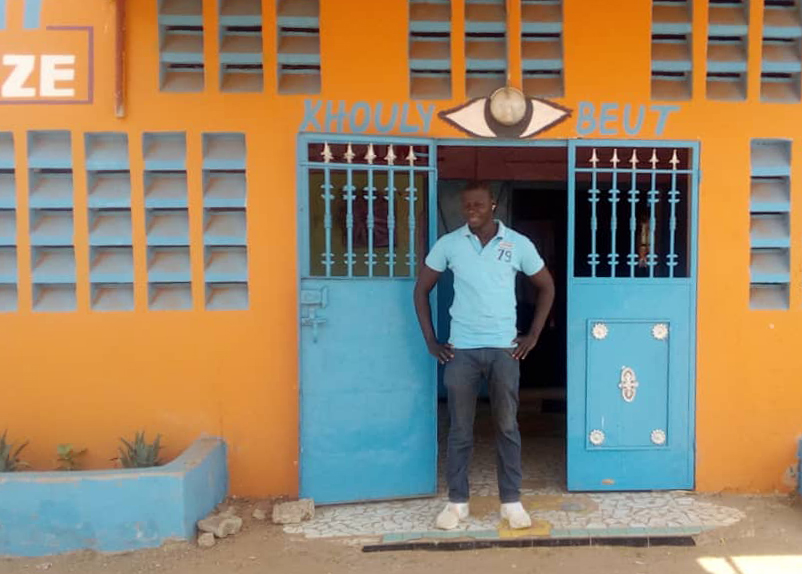
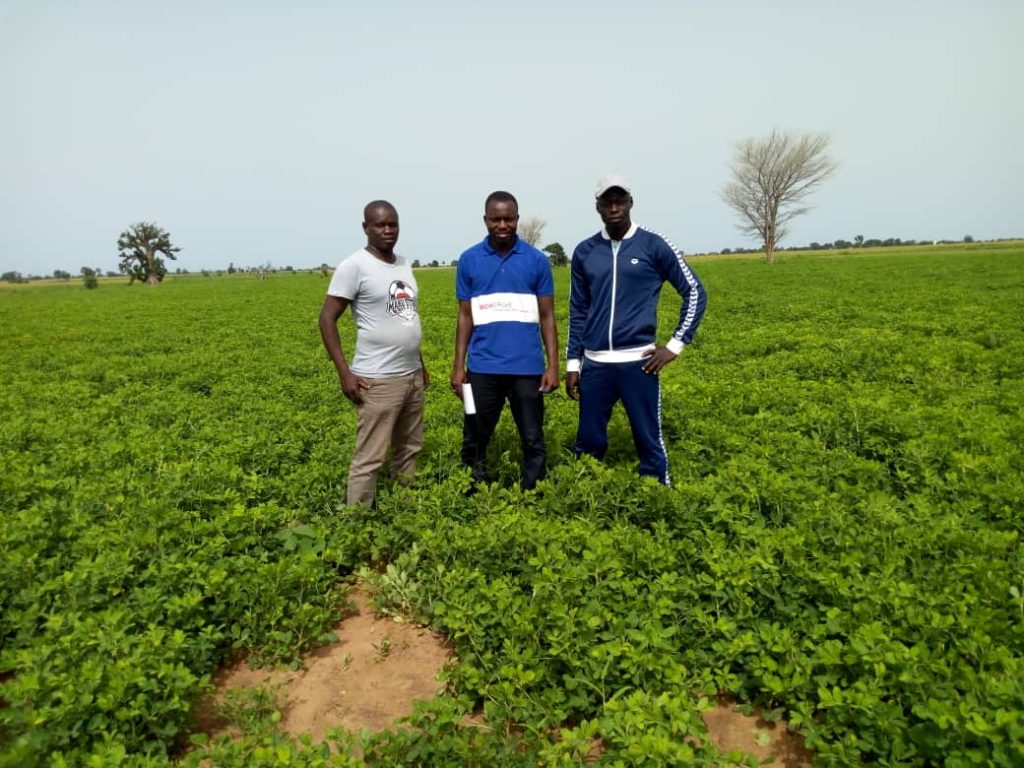
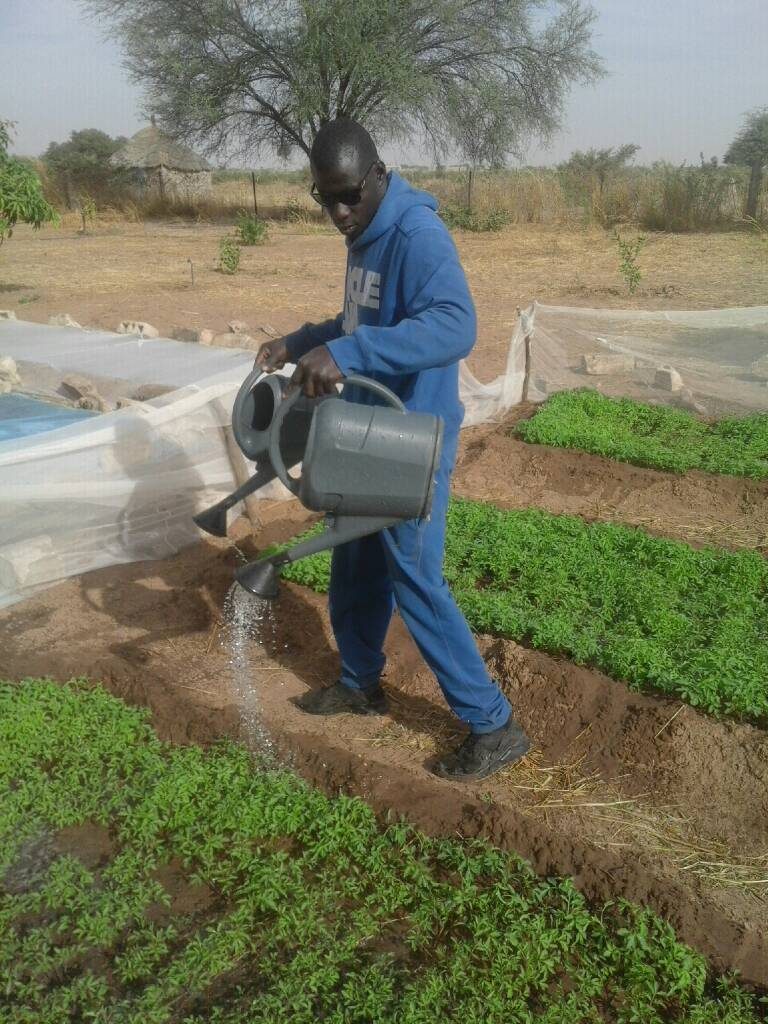
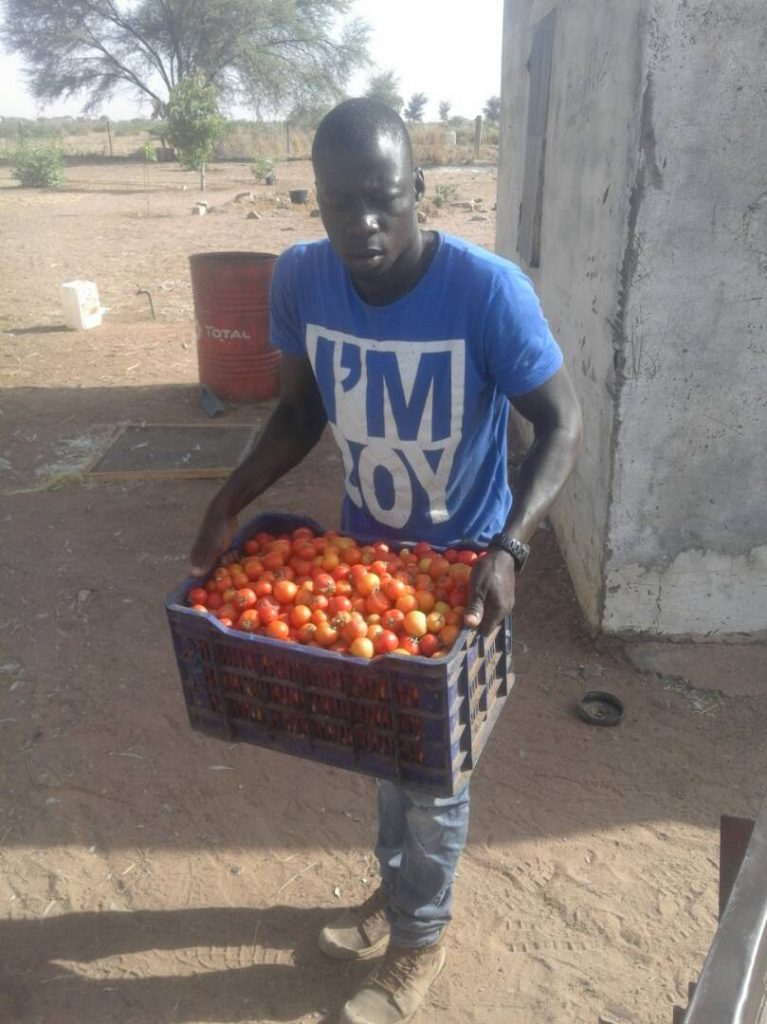


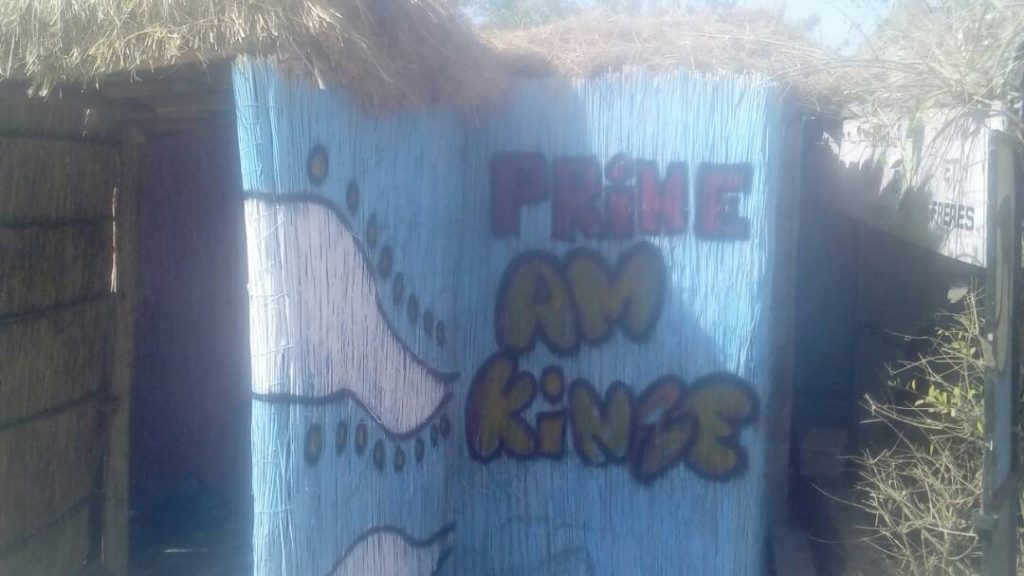
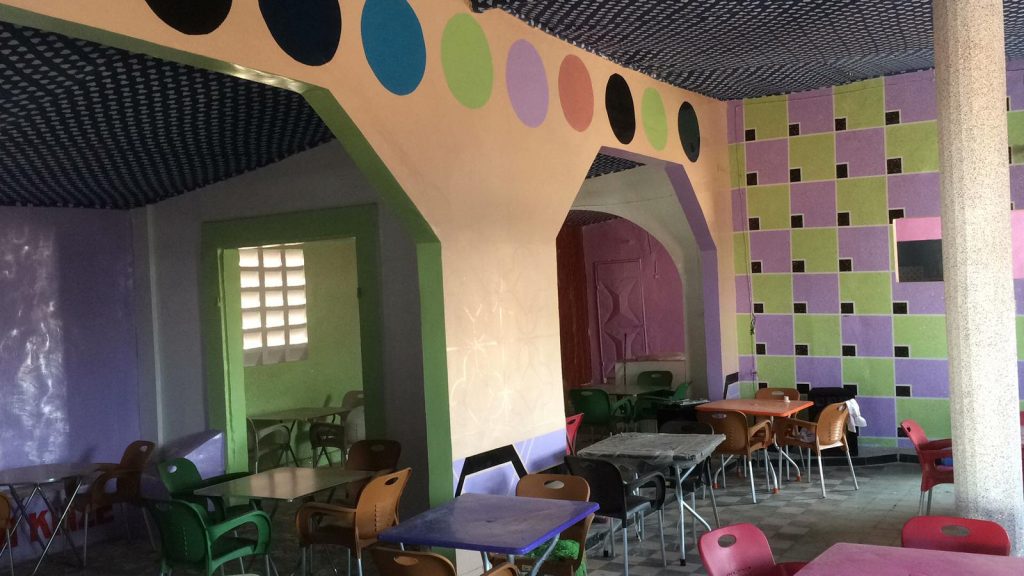

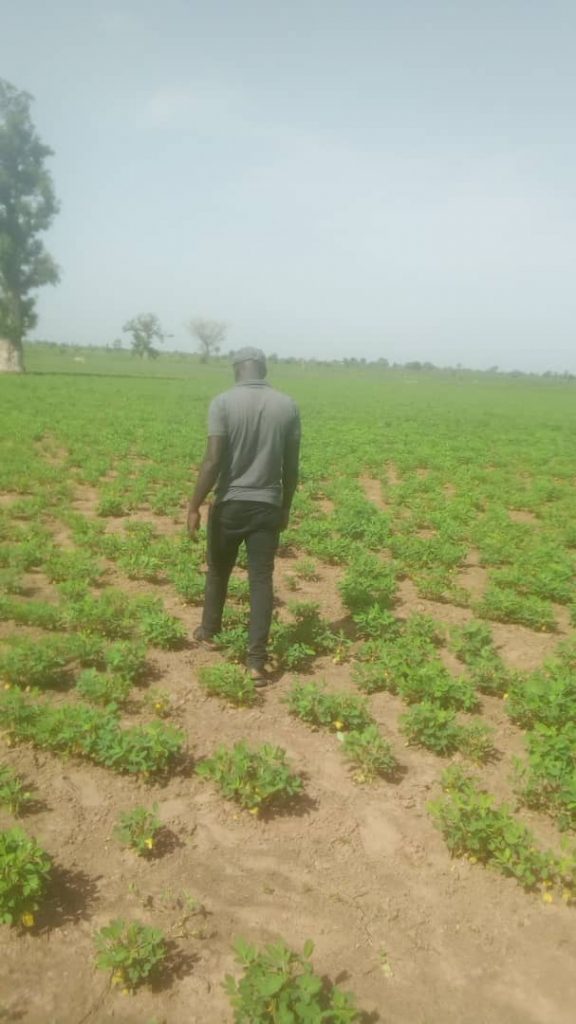
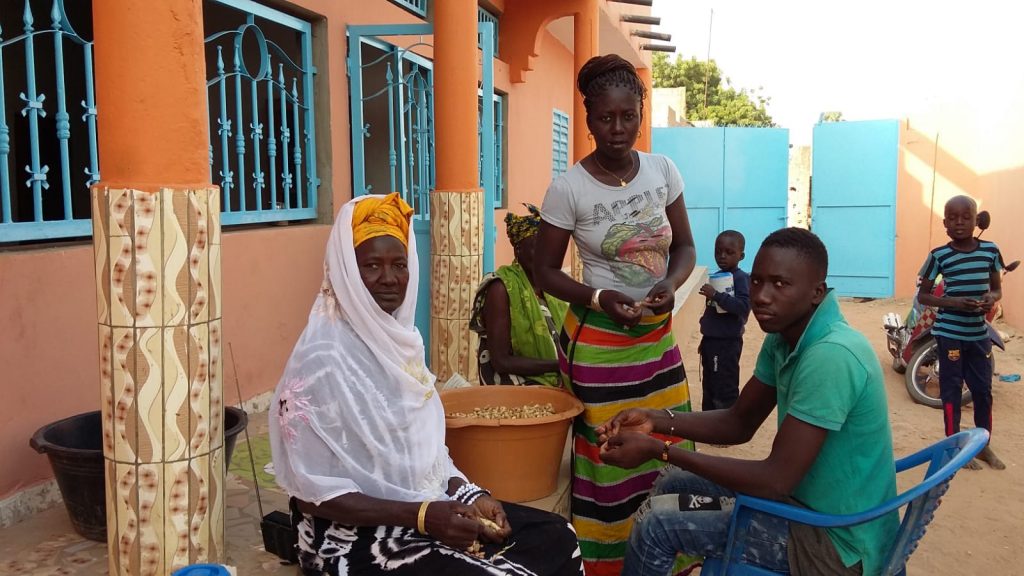
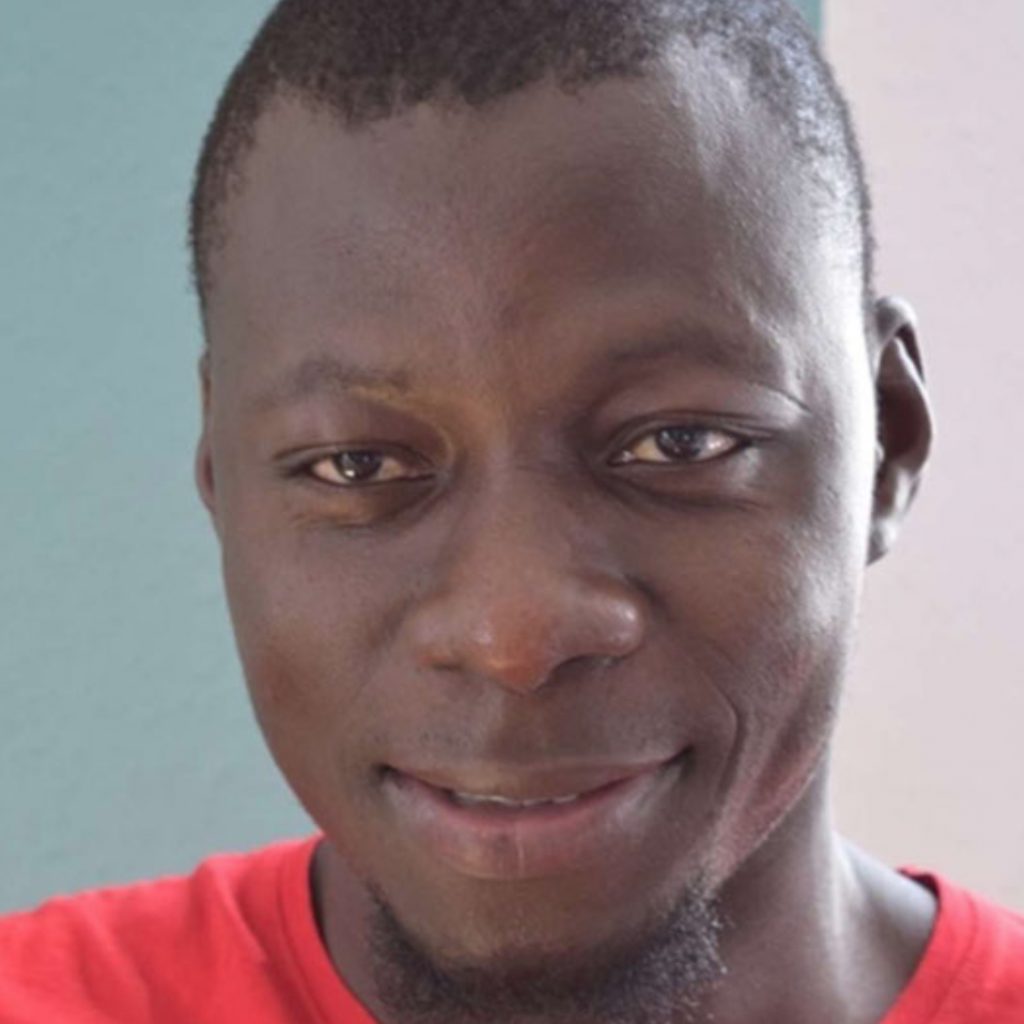
PROJECT BLOG
Babakar during the COVID-19 pandemic
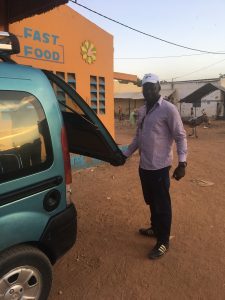 Three times a day, Babakar delivers food to the local hospital with his delivery truck. Since his delivery service is system-relevant, he can continue working during the COVID-19 pandemic. In his home country, case numbers for COVID-19 are still relatively low, nevertheless, a strict curfew is in place.
Three times a day, Babakar delivers food to the local hospital with his delivery truck. Since his delivery service is system-relevant, he can continue working during the COVID-19 pandemic. In his home country, case numbers for COVID-19 are still relatively low, nevertheless, a strict curfew is in place.
Receipts from "Prine am Kinze Prestige"
YASSA – Senegalese Onion Sauce
Ingredients:
- Oil
- 1 kilo onions
- 1 tbsp. black pepper
- 1 Maggi cube
- 1 tbsp. mustard
- 2 tbsp. vinegar
- A pinch of salt
Preparation:
Heat the oil. Add the chopped onions. Dissolve the Maggi cube in hot water. Sauté the onions until soft and deglaze them with vinegar, mustard and the Maggi broth. Season with salt and pepper and let it simmer for a while.
NIEBE – Senegalese Beans
Ingredients:
- 500g beans
- 1/8l Oil
- 2-4 tbsp. tomato purée
- ½ l water
- 1 tbsp. black pepper
- 1 Maggi cube
- 2 onions
Preparation:
Soak the beans in water overnight and cook them until tender. Dissolve the Maggi cube in hot water. Heat the oil and add tomato purée. Stir everything for one minute. Add the Maggi broth. Add pepper and a little chilli to taste as well as the chopped onions. Let everything simmer for a short while and add the beans. Let it simmer for another 30 minutes.
Serve rice or couscous with both sauces.
ENJOY YOUR MEAL ! – NA RESS AK JAMM!
Birthday preparations in "Prine am Kinze Prestige"

Housebuilding in Ndigue
 When Babakar said goodbye to his family in 2013, he promised them: „When I return, I will build two new rooms with the money I’ve earnt.” Even then, the living conditions were confined.
When Babakar said goodbye to his family in 2013, he promised them: „When I return, I will build two new rooms with the money I’ve earnt.” Even then, the living conditions were confined.
In the following five years, it was possible for him to send some money to his family who bought the first stones for the house. Since then, the stones are being dashed with water every morning to prevent them from crumbling.
So far, however, there is no money for further developments.
Babakar takes great care that the donations from Prien go only to his project. Everything he earns he reinvests at once, because he also made a promise to his supporters in Prien: to only use the donations for his project.
In the meantime, some people from Prien plan to visit. Two students want to lend their support to Babakar and his team for two months in autumn. Thus, the question of where they will sleep becomes more pressing.
The first two visitors had shared a bed with Babakar’s wife, while he and his son slept on mats on the floor in the same room.
Over the last weeks, our project team has come to the realisation that there needs to be a new building with two rooms for the family and one guest room for friends and supporters from Germany on the family’s property. We hope these plans can be realised in the near future.
Pepper growing in Musa
 Babakar has successfully grown and sold peanuts and the tomatoes are growing fast as well. Next, the growing of peppers will start. Peppers are used in most dishes in Senegal and can therefore be sold easily at the market. Since Babakar has never planted peppers before, he procures workforce and know-how from a village near the Gambian border. The men come early in the morning and bring with them their horse, a charrette, a plough and some fully grown plants.
Babakar has successfully grown and sold peanuts and the tomatoes are growing fast as well. Next, the growing of peppers will start. Peppers are used in most dishes in Senegal and can therefore be sold easily at the market. Since Babakar has never planted peppers before, he procures workforce and know-how from a village near the Gambian border. The men come early in the morning and bring with them their horse, a charrette, a plough and some fully grown plants.
In several steps, the soil is being prepared for the planting. The men first decide how much of the area should be planted, how narrow the rows should be and how many plants Babakar wants to grow.
Then, the horse and the two pepper farmers make ruts in the soil. Afterwards, two men, who help Babakar with his work, deepen the ruts with a pickaxe, so that they will be deep enough for the new plants.
Since the soil is completely cured from the 40° temperature at the beginning of dry season, the ruts have to be watered for one day. In this way, the soil is ideally prepared for next day’s planting.
Babakar gets water from his own water point. His father had it installed to supply the people of Musa with safe drinking water. The nearby traditional well is covered to prevent the villagers from drinking it and getting sick., Even though Babakar is very proud of his own water point, he considers to take his irrigation water from the well with a solar pump. Through this, he doesn’t have to pay high water bills, his vegetables yield more profit and he doesn’t waste valuable drinking water for watering. But until the solar pump and drip irrigation will take care of the watering and make the water consumption economic, it will take a while. Babakar first has to track down the best offer, find a sponsor and uncover the well.
The next day, the soil is humid and the pepper plants can be planted. Papa, Babakar’s brother, digs holes into the soil in regular intervals and the rest of the crew presses the plants into the holes and waters them once more.
In a couple of months, the peppers will ripen and become red, orange and yellow. Then they will be sold at the market. We are already looking forward to our first “home-grown” peppers!
"Prine am Kinze" - Babakar opens his restaurant
 From one day to the next, Babakar decided to open a restaurant in Senegal in honour of his German hometown Prien am Chiemsee. Right in the centre of Kaffrine, next to Gare de Routiere and a gas station and opposite of his mother’s market stand, he purchased a piece of land. He put his heart and soul into the project and with the aid of a gifted local graffiti artist, he built his own “Prine am Kinze” in a few weeks. Colourful, complete with thatched roof and coloured tiles, the restaurant offers traditional Senegalese food. Babakar has hired four professional female cooks from the region. They cook, arrange the food and sell the culinary delicacies to natives and travellers.
From one day to the next, Babakar decided to open a restaurant in Senegal in honour of his German hometown Prien am Chiemsee. Right in the centre of Kaffrine, next to Gare de Routiere and a gas station and opposite of his mother’s market stand, he purchased a piece of land. He put his heart and soul into the project and with the aid of a gifted local graffiti artist, he built his own “Prine am Kinze” in a few weeks. Colourful, complete with thatched roof and coloured tiles, the restaurant offers traditional Senegalese food. Babakar has hired four professional female cooks from the region. They cook, arrange the food and sell the culinary delicacies to natives and travellers.
In “Prine am Kinze”, you notice immediately that the builder has spent some time in Europe. The floor has been tiled immaculately, there is a Western-style kitchen with a gas stove and even a refrigerator. The seating area has also been generously furnished. The sofa corner is from a Kaffrine designer, the chairs and tables could also be found in a café in Dakar. The TV on the wall shows Senegalese music videos and the electric fans make you forget about the heat outside.
The cooks serve Yassa Poulet, Babakar proudly says that this are his own chickens being served. It tastes delicious and looks fantastic. Few of the street vendors here know that you eat with your eyes first. As dessert there is ice-cooled couscous with strawberry yogurt out of plastic sachets. It tastes a little artificial but also fairly good and quite like Senegal.
The next day, Thiebou Thien, the Senegalese national dish is on the menu. Depending on what the women find at the market, the dishes vary from day to day.
Babakars next plan is to let his cooks cook also for bigger events and companies. To realise this, he is in the process of getting a catering licence. He also likes the idea of a pâtisserie, where people would come in before noon. So, “Prine am Kinze” is far from having used its capacities to the fullest and Babakar probabaly won’t cease to have new ideas anytime soon.
Peanuts – the start of Babakar's agriculture
 In May 2017, we had sent the first donations to Assane Lo, Babakar’s friend and teacher, with the request to use them for peanut growing on Babakar’s piece of land. After a while, we received pictures of lean cows pulling a plough on the fallow land in order to prepare it for the peanut sowing. When Babakar returns to Senegal in November 2017, the peanuts have already been harvested and lay out to dry in six heaps. He helps with the gathering of the peanuts and peanut straw. A part of the peanuts is stored in a central facility in order to be used as seeds during rainy season in June. The rest is being provided for the extended family and the harvest helpers. The peanut straw serves as basic food for draught animals; Babakar sells a proportion to a merchant and keeps the rest for his two cows and one donkey.
In May 2017, we had sent the first donations to Assane Lo, Babakar’s friend and teacher, with the request to use them for peanut growing on Babakar’s piece of land. After a while, we received pictures of lean cows pulling a plough on the fallow land in order to prepare it for the peanut sowing. When Babakar returns to Senegal in November 2017, the peanuts have already been harvested and lay out to dry in six heaps. He helps with the gathering of the peanuts and peanut straw. A part of the peanuts is stored in a central facility in order to be used as seeds during rainy season in June. The rest is being provided for the extended family and the harvest helpers. The peanut straw serves as basic food for draught animals; Babakar sells a proportion to a merchant and keeps the rest for his two cows and one donkey.
Vegetable growing starts
 On 10th January, the vegetable growing started. Mostly tomato seeds had been applied in seed trays and developed into strong little plants. Using two oxen and a one-body plough, the soil beneath the planted mango trees was ploughed up and now awaits the first vegetable plants.
On 10th January, the vegetable growing started. Mostly tomato seeds had been applied in seed trays and developed into strong little plants. Using two oxen and a one-body plough, the soil beneath the planted mango trees was ploughed up and now awaits the first vegetable plants.
In order to separately bill the water consumption for the mango plantation and for the chickens and vegetable, a new water clock is going to be installed in January.
The project gathers speed
 In early December, 22 family members met with Babakar to talk about his project. They gave him the already existing chicken coop as well as the mango plantation as an outdoor pen for the chicken. One part of the land was selected to cultivate a vegetable garden.
In early December, 22 family members met with Babakar to talk about his project. They gave him the already existing chicken coop as well as the mango plantation as an outdoor pen for the chicken. One part of the land was selected to cultivate a vegetable garden.
After the family members had been paid and the chicken coop belonged to Babakar, the renovation works started immediately.
Together with friends, he whitewashed the chicken coops and prepared everything for the moving in of the animals.
A couple of days later, the first 150 chickens moved into their new home. After the first chickens had moved in, the reaped peanuts and the peanut straw for fodder had to be harvested. Both was being prepared for storage and gathered from the field. The structurally complete coops in the chicken coop building where no chickens were living were used for storage. Because of the storage facility, there was the chance to sell the peanuts only at increased demand at a better price.
First trip to Senegal
 Uta Mewes was the first of our project group to visit Babakar at home. For 12 days, she lived with his family, shared their every-day life and experienced the living conditions of Babakar’s environment at first hand.
Uta Mewes was the first of our project group to visit Babakar at home. For 12 days, she lived with his family, shared their every-day life and experienced the living conditions of Babakar’s environment at first hand.
In order to better understand Babakar’s background, Uta visited the village Musa. Based on the numerous houses that were abandoned and in ruins, one could surmise how many people had already left the village, because they had no livelihood there. Only one place brimmed with life. One of Babakar’s brothers had established a mango and banana plantation. The once used chicken coops were also on this premise.
And one piece of Babakar’s land, exposed to the hot sun and wind since there were almost no shade-giving trees, was in cultivation again. The first peanut harvest could be brought in and the peanuts and the peanut straw lay out to dry in big heaps. Babakar described where the tomatoes had once grown, showed Uta the water point and the destroyed water clock.
This place, Musa and its lands, had surely seen better days. Every now and then, the question was raised about what would become of this place in the future.
Uta also met Asane Lo, Babakar’s childhood friend, who acted as Babakar’s surrogate and coordinator during his time in Prien. Over the last few months, Asane Lo had become a confidant of the project teams with whom you could talk about every topic and issue. Uta found him to be just as friendly and upright as expected.
He was one of the few in Babakar’s life who encouraged him to pursue his return and create a livelihood for himself and his family at home. However, many of his friends and acquaintances didn’t understand his motives. If you’d made it to Europe, they thought, you were affluent and could support your family much easier from there. His project led to some conflicts and demanded great patience and many explanations in order to persuade his peers of his progressive ideas.
First news from Senegal
 Since his return to Senegal, Babakar has stayed in touch with us. He sends us pictures and voice messages regularly and let as participate in his arrival in his old home.
Since his return to Senegal, Babakar has stayed in touch with us. He sends us pictures and voice messages regularly and let as participate in his arrival in his old home.
Focus on departure
 In the second half of October, the date for Babakar’s departure was finally settled on 3rd November 2017. Before this day arrived, many personal arrangements had to be made to prepare for his first flight. He had many questions: How much luggage can I bring? What goes in the hand luggage and what doesn’t? How do I get to the airport? Who accompanies me? When will I arrive in Dakar? Actually, Babakar would’ve liked to return at the beginning of October, but in this way, he could participate in two shows by the music project “Vom Klang der Welt” where he could present his distinct character with his dances and audience animation.
In the second half of October, the date for Babakar’s departure was finally settled on 3rd November 2017. Before this day arrived, many personal arrangements had to be made to prepare for his first flight. He had many questions: How much luggage can I bring? What goes in the hand luggage and what doesn’t? How do I get to the airport? Who accompanies me? When will I arrive in Dakar? Actually, Babakar would’ve liked to return at the beginning of October, but in this way, he could participate in two shows by the music project “Vom Klang der Welt” where he could present his distinct character with his dances and audience animation.
During his last four days in Germany by a team of journalism students from Munich accompanied him. They produced a multimedia documentation about his departure and covered his last activities: The final dinner with the project team, the last performance at “Klang der Welt” in Weilheim, the last talk at the ZRB in Mühldorf and finally, the farewell at the airport on 3rd November.
Even the paperwork is sorted out
In September, we concentrated on Babakar’s exit papers and stumbled upon some unexpected administrative barriers.
The Senegalese Embassy resumed their rhythm of work in September; however, all the applications went missing during the moving process. Therefore, all the documents and photos for Babakar’s departure had to be submitted once more.
Up until then, so much time had passed that we almost exceeded a ZRB deadline, which would have interfered with the disposal of promised funds.
It was only thanks to the support of friends in Berlin that the papers reached the right desk at the last minute.
In all this excitement, Babakar also lost his German papers and his Senegales Carte d’Identité. The police in Prien promised their support but didn’t issue a notice of loss, so that his suspension almost wasn’t extended at the ZAB in Munich.
Plus, he wouldn’t be able to open a bank account in Senegal to ensure that project funds would be received properly without a Carte d’Identité.
However, after one week of turmoil, everything was sorted out. The Prien police even personally handed Babakar his Carte d’Identité.
Change of plans
 Originally, we – Babakar, Uta and Anna – had planned a three-week-long holiday in Senegal together.
Originally, we – Babakar, Uta and Anna – had planned a three-week-long holiday in Senegal together.
During this time, we wanted to visit Babakar’s village Musa, his friends and family as well as our project partners. We also wanted to set up a project account, discuss the bookkeeping, take pictures of the peanut fields and make purchases for future projects. But Africa wouldn’t be Africa, if plans didn’t change.
On 11th August, Babakar’s project was approved and supported by the ZRB with an unexpected amount of 2000 €, however, we learnt that the Senegalese Embassy had closed their doors on 2nd August indefinitely. Thus, we could not apply for visas for the second half of August.
At this time, Uta was already in Senegal and Anna had already booked her flight. She decided to start the journey without Babakar – Inshallah – “If God wills”, he would follow soon enough.
This, however, wasn’t about to happen, since the embassy resumed their work only a couple of days ago – the mills of bureaucracy grind slowly. Therefore, Babakar is going to return to Senegal when Uta and Anna will already be back in Germany.
For the first time, we got to know the country and its people and gathered experiences for future projects without a direct connection to Musa and Babakar’s friends and family.
TRAVEL ACCOUNTS
Travel account Uta Mewes - Part 1
Farm impressions
Since my first visit with Babakar’s family, a lot has changed for the people living there. But also, the animals are much healthier now and the houses belonging to the farm have changed as wll. A new home has been built that closes the farmyard to the south. It has five rooms, partly already in use, such as the guest room with an ensuite bathroom, where I stay this time.
The shell construction was built with donations from Prien to provide a sleeping accommodation for the visitors from Germany. Babakar was able to pay for rendering and painting himself.
While I relish my private refuge, the women mingle on the colourfully tiled terrace of the new house to work and relax.
No matter how hot the sun was burning at noon, there was always enough space in the shade for everyone. Shade is a rare good, especially since the yard tree died two years ago and the merciless sun absorbes almost every shade from the walls. The small tree surrounded by stones that is going to become the new yard tree still has to fight for its right to exist. On the terrace, great amounts of peanuts are being cracked. A rhythmic sound, sometimes drowned out by the women’s chatter.
During rainy season, 4,5 hectares of land had been cultivated with peanuts and millets for the first time again, covering the family’s need of couscous and peanuts for one year. The peanut supply was so high that the women could sell them pealed or as peanut butter. A small contribution to ensure the livelihood at the farm. You pay 500 CFA (ca. 1 Euro) for 1 kilo of peanuts at the market. This amount eight times is needed to ensure the livelihood of everyone at the farm for one day. Not including extras like Attaya, fruits or candy for the kids, not to mention hospital- and medical bills. However, they all do their best and “Inshallah” (if it is God’s will, typical Senegalese saying), together, they will manage the incurring costs.
While the girls and women crack peanuts in the morning or handwash the laundry, one of them cooks lunch for everyone, even for family members who work outside and to whom the food has to be delivered. When Babakar’s mother comes home from her market stand, the afternoon begins by drinking Attaya. This traditional tea ritual consists of brewing and frothing green tea with sugar multiple times. It is practiced by most families everywhere in the country.
Then it is time to relax. The ducks, three geese and an impressive gobbler are let out of the coop. The gobbler courts the geese, goats leap in the yard and three donkeys wander around. In the evening, humans and animals return to the farm. Dinner is prepared for everyone and another day is drawing to an end.
When the moon shines its bright light on the farm, the air is filled with songs from the mosque and the donkeys give a concert, the TV set is connected to the solar storage and everyone watches TV until the electricity runs out.
Senegalese music, commercials and Senegalese films in Wolof offer a diverse programme and cover topics that move the people in this country who live in an area of tension between tradition and modernisation. There is a slight feeling of awakening at the farm, in spite of all the unresolved problems of everyday-life. Those were my impressions during my second visit with Babakar.
Travel account Uta Mewes - Part 2
Representatives of the Senegalese Ministry of Foreign Affairs at Babakar’s
That life takes place in the present and long-term planning is rather secondary, is a vital part of Senegalese reality. How much this is true, I learned from the Senegalese Ministry of Foreign Affairs.
On Wednesday evening, 09/01/2019, late after 8 pm, Babakar received a call from the governor of Kaffrine, whether the event room would be available on 11/01 for the Ministry of Foreign Affairs. A reunion would be hosted for former migrants from the Kaffrine region. 40 guests were to be expected, even though neither the governor nor Babakar knew how within one day, 40 men with migrant background could be informed. Anyway, Babakar planned 40 meals to use this occasion to advertise his room via word-of-mouth recommendation.
From Thursday on, the women had their hands full because on Thursday night, a big birthday party had to be hosted and on Friday morning, the room had to be redecorated for the reunion and 50 meals had to be cooked. The men prepared the necessary technology the previous evening. Everything went like clockwork.
At 8 am, the rearranging started and around 10 am, the room began to fill. With German thoroughness, I counted the guests: 25. And in the kitchen, meals were prepared for twice the number. I decided to no longer think about it and helped the women with pealing and chopping of onions and garlic. Suddenly, Babakar darted into the kitchen: “Uta, pictures!” I took my phone and was surprised that at least 40 men with migration background filled the room. An employee from the Ministry of Foreign Affairs and I were the only women present.
Everyone introduced themselves quickly to three Ministry employees, saying their name, migration country and length of their stay there: Italy, 3 years, Libya, 5 years, Egypt, 6 years, Spain, 10 years, Germany, 2 years… I quietly asked Babakar what the purpose of this event was. Babakar said he understood my question but didn’t have an answer either. During the break, Babakar introduced me to Samba Diof, who operated the reintegration office in the region of Kaffrine. We started a conversation during which he explained the reason for the event.
The GIZ Germany would start supporting individual return projects in 2020, e. g. via bank lending with an interest rate of 7%, much lower than the usual 35% in Senegal. In 2019, the groundwork for this economic support from Germany had to be laid, and applications had to be submitted in order to implement the project in 2020. This first trip had three stops to advertise the GIZ programme and to inform former migrants from the regions of Fatikh, Kaolack and Kaffrine at an event. I was stunned when the young man told me that the third stop and thus the third travel day had been organised only after the first event in Fatikh on the way to the hotel in Kaolack.
And it still worked, even though my expectations of how an official government commission organises, were shattered due to the Senegalese reality. It showed me that our way of life – planning everything in advance – is only one alternative of many.
Travel account Caro Thaller - Part 1.1
 Progress in Musa
Progress in Musa
Like Helke in August, I too had the chance to stay at Babakar’s newly built house for two weeks. The arrival was exciting, the whole family gathered in the yard. Many women, among them Babakar’s aunt and some sisters, sat in the shade of the house and separated peanuts from the straw; Cothia, Babakar’s wife, prepared lunch, a sister made tea and the men relaxed after a hard day’s work on the field. I was welcomed very warmly and friendly, even though our communication was limited to sign language. After a lunch that consisted as usual of rice and fish, Babakar drove me to Musa on his motorcycle. There, he showed me how the plantation had developed since Helke’s visit.
The chilis Helke told us about are now all harvested. Babakar had invested the returns in the growing of melons: one hectare in Musa and seven hectares in Wande. The area cultivated with melons is located directly next to the two hectares of peanut plantation and is being protected daily by an employee from the free-roaming cows of the neighbour.
The majority of the peanuts lies in small heaps on the fields to dry. According to Babakar, the drier the legumes are, the higher the price. The rest of the harvest is stored in the family house to be roasted and made into peanut butter. Then, Babakar’s mother is going to sell it at the market on the main road.
During my visit, we grew three small fields of tomatoes: two with conventional hybrid seeds from a store in Kaffrine and one with seed-fast bio seeds from Germany. Uta had given the seeds to me in order to encourage Babakar to reproduce his seeds on his own, independent from seeds companies, to reduce costs.
Babakar agreed to keep the seeds from the harvest and even to establish the culture anew, provided the returns would be lucrative. A small success for me on the way to more efficiency and at the same time more sustainable thinking and economic activities.
Furthermore, we prepared the chicken coops. After the breeding pause, due to Toubasci and rainy season, 400 baby chicks would live there again. Within a few weeks, they would become chickens and would be sold at the Kaffrine market. From time to time, Babakar would receive a call and shortly afterwards, he’d start his motorcycle, a frozen chicken under his arm. He works himself all the time, sometimes as a chicken courier.
For the first time, a compost was going to be built in Musa. Hay, straw, plant remains and animal faeces will humify there. Dispersed on the fields, the humus will provide the plants with nutrients and increase the soil water storage capacity. An important and efficient method to make the parched, hard soils arable for planting.
Travel account Caro Thaller - Part 1.2
 The melon plantation in Wande
The melon plantation in Wande
We made another trip to Wande to inspect the seven hectares of melons and to make sure everything went well there. Arriving at the first field, I was hardly impressed. On approximately 1 ½ hectares, there lay a few green balls at the size of table tennis balls. They were so small, I was told, because these melons had been established quite recently. I remained sceptical. In the shade of a tree, there were much bigger melons though. An indication that an agroforestry system would be very useful for this area.
Earlier, I had been made aware by Senegalese agriculture experts that agroforestry systems prove to be well-working methods for farming in sub-Saharan Africa. Because of trees and bushes on the fields, the soil is being provided with enough biomass, which improves the water storage capacity and gives shade to the field crops on hot days. Perhaps we could tell Babakar about this sort of cultivation and persuade him of a test run.
As it is often the case in this country, I was soon surprised: The other hectares were full of big green melons. One fruit fell to the ground and its taste and optics really persuaded me! Soon, harvest will start here, too.
Travel account Caro Thaller - Part 1.3
 Renovation work in the new event room
Renovation work in the new event room
Babakar’s latest project is the renovation of an old restaurant. He wants to turn the big building into an event room for celebrations, presentations, catering and more. There is no such room in Kaffrine so far, even though it is in high demand by both companies and private persons. The ceiling and the tiled floor are already finished. On the floor, it says “Prime am Kinze”. Babakar couldn’t be deterred to pay another tribute to his German hometown. Some villagers even cheerfully call him “Prime-am-Kinze”, thinking that is his name. Now, the walls will be painted. When I visit Babakar in one week, the opening celebration will take place.
Travel account Caro Thaller - Part 2
Opening ceremony of “Prine am Kinze Prestige”
When I returned to Babakar and Kaffrine one week later, the room had been renovated and preparations for the big opening ceremony were already under way. On the day of the party, we got up even earlier than usual, fed the chickens and drove to “Prine am Kinze Prestige”. I went to the market with the cooks to buy ingredients for the dinner, while the men cleaned the floor and set up the tables. After shopping, the cooking started. The six cooks and myself chopped, stirred and kneaded to prepare the meals. We made meat skewers with home-made fries and salad, followed by desserts of home-made cookies and cake with melons.
The guests would arrive at 8.30 pm. When we managed to be ready at the exact time, suddenly, everyone went home. Babakar noticed my confusion and explained to me that the invitations were meant to be understood in Senegalese time: it said 8.30 pm, but people would arrive at 10.30 pm. When we returned to the room at 10 pm, only a handful of guests had arrived. Babakar had been right.
The mood was cheerful during the whole evening. The guest seemed to be thrilled with the design of the new room as well as with the food. After the tables had been cleared, there were speeches, dancing and singing. Babakar enjoyed the celebration quietly from the sidelines. Even when his successful project was mentioned in a speech, he just smiled during the applause. All in all, the party was a thorough success! Now, I will return to Germany, while Babakar’s event room activities will start. Uta, who is going to visit Babakar in a few weeks, will report on the further developments.
Travel account Helke Fussell - Part 1
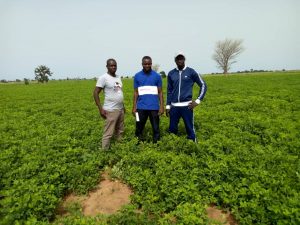 Agriculture in Musa
Agriculture in Musa
A lot has changed since Anna’s visit. The tomatoes are harvested. The returns won’t be quite as high as expected but still acceptable. Now, everything is focused on the chili growing. An expert chili farmer has stayed in Musa to work with Babakar. He and Papa, Babakar’s half-brother, tend to the vegetable growing around the clock. In Musa, it will take one to two weeks until the harvest can be brought in. But Babakar has also leased two fields near the Gambian border, where he employs three local workers. We collected the first harvests together: 47 kg extra hot chilis. I bit into one – an experience I won’t forget. Meanwhile, I hear about harvests of more than 200 kg per week. The chili growing seems to be going great.
On the large fields in Musa, millets and peanuts are in cultivation. One field is being saved for melons that will be cultivated sometime soon.
The chickens have been reduced to 70. And the remaining ones are going to be slaughtered during our stay. Caspar was a witness to this process; I was too scared. It was only my second day in Kaffrine and I still struggled to adapt to the heat and the different conditions. I surely wouldn’t have stood the slaughtering. Since the sacrificial feast Tabaski was approaching for which sheep were slaughtered, chickens weren’t in demand, which is why the breeding stopped till after rainy season.
The families from Musa have their own fields to make a living. Babakar provided them and pays for the watering. They are content and grow vegetables together. However, the water point has proven to be a challenge. The investment into the water supply line was very progressive at the beginning and provides the villagers with clean drinking water.
But because of the fields were watered through the water point, the water consumption and therefore the water bill increased significantly. By now, the water bills make void large parts of the returns. Plus, in this way, Babakar is indirectly dependant on state water companies.
But the old village well still exists. Babakar called for a village meeting, where I was introduced. He then explained how life was like before the water supply line. Finally, it was decided to reactivate the well and to obtain water for the fields with the help of a solar pump. In this way, the water from the line serves as drinking water for the villagers and the water bill is reduced to a reasonable amount.
Travel account Helke Fussell - Part 2
 It was a great honour for me to be invited to the farm of Babakar’s mother and to sleep in his new house. However, the encounters I had with the women on the farm, Babakar’s mother, his wife Cothia, his mother-in-law, sisters and sisters-in-law, were difficult for me.
It was a great honour for me to be invited to the farm of Babakar’s mother and to sleep in his new house. However, the encounters I had with the women on the farm, Babakar’s mother, his wife Cothia, his mother-in-law, sisters and sisters-in-law, were difficult for me.
It was apparent that we came from totally different worlds. Here, it seemed a little like the simple life in Germany 100 years ago.
The women prepared a meal for several dozen people, wearing colourful clothes we would wear only for special occasions. They ate together, cleaned and chopped the vegetables and cooked the meal on an open fire. Individual bowls of food were being prepared for the different group of guests. Babakar took one and drove to his plantation in Musa with his motorcycle.
Even the laundry was done by hand, with lots of foaming Omo. Afterwards, an old-fashioned coal iron was used to iron the clothes on the ground. Such a washday is quite exhausting, especially in the heat. Cothia, Babakar’s wife, was very devoted to the task and washed the clothes of the whole family. Apart from the mother, the women spoke only Wolof, because none of them had gone to school. Still, there were high expectations from the “Toubab” (Wolof = “whites”) despite the language barrier. “Will you give me a phone?” was the first question in broken French.
Travel account Helke Fussell - Part 3
 The marabout and the minister
The marabout and the minister
I was impressed how peaceful and respectful Muslims and Christians manage to live together in Senegal. On the first Sunday of my stay, I went to the protestant church – following the advice of Babakar’s pious Muslim friends. The minister spoke in flawless French and was also the headmaster of the protestant school. He was very congenial and had a wonderful singing voice. The songs in Wolof were melodious and catchy. He explained afterwards that most of the pupils were Muslims. Even though Christian prayers were offered before school, religion was not a topic during classes. But there are also Franco-Arabic schools in Senegal, which propagated fundamental Islam. Some of them had already been closed as there is often great scepticism against them.
I also had the chance to meet Babakar’s marabout and his friend Abdul Aziz. Marabouts are spiritual ministers and counsellors, there words carry great weight for the natives. The marabout, a charming man, readily answered our questions. I immediately made a blunder when I directly mentioned the waste problem. You don’t do this in Senegal, it is seen as very indiscrete. “You Europeans always want to solve problems of ours that we don’t even have,” replied the marabout, and he was right. For many problems, the Senegalese don’t seem to have any awareness.
Caspar Schwietering, journalist for the FAZ, posed the interesting question what the marabout would advise if people asked him if they should leave for Europe. The answer was blunt: “Do it. Here, in Senegal, you don’t have any prospects.” I was stunned by his answer. But the subsequent prayer ceremony we attended touched me. The ritual, the abandon, the singing, the prayers seemed to give the local people a lot of strength.

